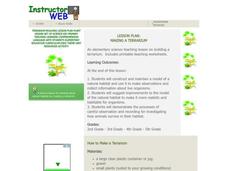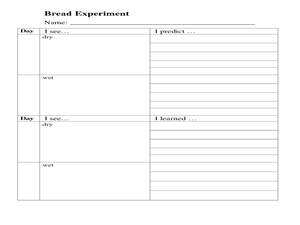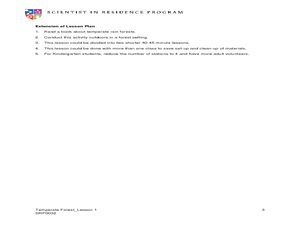Curated OER
Amazing Grazing: Keeping Our Ecosystem Running
Students discover the value of sustainability within our ecosystem. In this ecological lesson, students discuss the importance of a food cycle in our society, and how humans can improve the conservation of a healthy ecosystem. Eventually...
Curated OER
"Web of Life" Game
Students relate members of an ecosystem by their interactions. In this ecosystem lesson, students toss a ball to other members of their group (each representing a member of an ecosystem) and tell how they are related to that member....
Curated OER
Jackie Gore
Students identify the amount of heat given off by solar energy. In this solar energy lesson, students complete an experiment using soil and sand measuring the heat from solar energy.
Curated OER
Making a Terrarium
Students construct and maintain model of natural habitat, suggest improvements to the model of the natural habitat to make it more realistic and habitable, and demonstrate careful observation and recording of how animals survive in their...
Curated OER
Funky Fungus
Students discuss decomposition, bacteria, fungi and other microscopic organisms. They participate in an experiment to grow fungus on bread. As the fungus colonies grow, students observe them under a microscope to identify and locate...
Curated OER
Ecosystem Game
Students examine the ecosystem by playing a game. In this ecosystem lesson, students are put into groups of decomposers, consumers, and producers. Students create a list of animals that fit into each group and items that represent...
Curated OER
Microorganisms: Good Guys or Bad Guys?
Students discover the role microorganisms play in our lives. In this decomposition lesson, students examine decaying foods and plants in order to analyze the different bacteria that grows. Students discuss the good and bad of...
Curated OER
Plant and Animal Cells - Are they Different?
Students observe the similarities and differences between plant and animal cells. In this cell activity, students use microscopes to observe self prepared slides of animal and plant cells.
Curated OER
Now You See It, Now You Don't
Learners explore organic and inorganic objects. In this environmental lesson students perform a composting experiment using flowers in different soils. Learners record their observations.
Curated OER
Forest Decomposition
Students explore decomposition. Students define and describe components of the decomposition process. Students make a composter in a terrarium. Students record observations and changes weekly, drawing conclusions about the results...
Curated OER
The Water Cycle
Learners simulate the water cycle. In this water cycle lesson, students create a model of the water cycle. Learners draw the water cycle and write a paragraph explaining their drawing.
Curated OER
PICTURE PERFECT PYRAMID
Students create a model of the USDA's Food Pyramid Guide, using shoe boxes. They bring an assortment of shoe boxes from home. Students are given a copy of the "Food Guide Pyramid." They wrap boxes for the bread group in white, the...
Curated OER
Splish! Splash! Birdbath
Students explore the concept of philanthropy. In this service learning instructional activity, students research city wildlife then plan and implement a service learning project that benefits wildlife.
Curated OER
Weather, Climate and Atmospheric Process
Students explore Earth science by completing a could identification activity. In this weather lesson, students discuss the different forms of measurement for the weather of Earth. Students discuss global warming and examine a list of...
Curated OER
Carrying Capacity of Ecosystems
Learners define population and carrying. In this algebra instructional activity, students explore exponential growth and decay based on animals and things that grow or decrease exponentially. They graph their findings and discuss their...
Curated OER
A Wild Chain Reaction
Students explore habitats. In this habitat lesson, students break into groups and are labeled as a part of a habitat. Students then do an activity with yarn that shows how all of the parts are connected and depend on each...
Curated OER
Forest Food Chains and Webs
Students explore forest ecological systems. In this ecology lesson, students classify forest plants and animals according to their ecological roles. Students play a related vocabulary guessing game. Students choose a card on which...
Michigan Sea Grant
Wetlands
Wetlands may not sound particularly ornate, but they are as important as any habitat! With a hands-on activity, young scientists build a wetland model and observe its many functions in action. They discover the importance of wetlands to...
Curated OER
Our Friends or Foes
In this living organisms worksheet, 6th graders choose the multiple choice answer to 10 questions. Students then read and answer 10 statements as true or false and fill in the blanks to 5 statements.
Curated OER
Building a Butterfly Garden
Students examine the habitat and life cycle of a butterfly. In this early childhood lesson plan, students identify the parts of a butterfly, as well as the stages of the butterfly life cycle. Students also plant a garden in which they...
Curated OER
Fifth Grade Life Science Review/Quiz
In this life sciences review or quiz worksheet, 5th graders use recall of knowledge to answer multiple choice questions. Students answer 20 questions.
Curated OER
Exploring Forest Objects
Students explore the forest. In this ecosystems lesson, students rotate through sensory activity centers, brainstorm, and read about temperate forests.
Curated OER
Explore Your Natural Habitat
Students identify habitats and understand why they are important to our environment. In this environmental lesson plan students design their own habitat, observe and record data on the impact their habitat has on the environment.
Curated OER
The Discovery of Photosynthesis
Students explore how scientists discover photosynthesis. In this biology lesson, students identify the basic requirements for photosynthesis to happen. They recreate past scientists' experiments and record their observations.

























